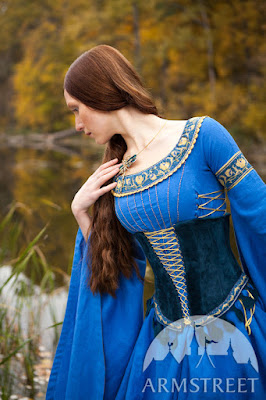In a grey tower by the window’s side,
Astolat,
heavy stone beneath her feet,
feathered
in the night, sheaves of yellow wheat,
flaccid
over the hillsides, singing bide,
townspeople,
toward happy, ringing stare
at
the dark windows of mirrored Elaine,
at
the rose petals, blood-red, falling plain
on
the remnants of her red fragile hair,
where
she combs like water, reddened tresses,
where
she winds her way accursed, alone,
whilst
the mirror would crack a lovely woman:
skirts
drag the floor of her linen dresses,
and
her blue, the scent of the river foam;
underneath
the laurels, she rested then.
Shrouds
of a petal, nuanced in shadow,
she
wafts slender; as young as she is old.
Upon
the ramparts stretched like blackened mould
across
stagnant old rock water shallows:
the
fingers of the ancient world as sleet
as
they were sunshine, the tulips, scarlet,
and
the weavers barter on the market,
rumbling
verse endowed upon the shod feet
of
the villagers, and their wooden dance.
For
the curse unnamed had turned them almost
stone,
rendering arms dilapidated,
crumbling,
creeping across the encampments
of
all damp England and its lonely host.
She
sees only the mirror’s reflection.
The
visionary gift has resided
within
the pangs of her ivory breast;
what
she sees waxes poetic at best,
elm
over bluebell in dell presided.
What
she fears thunders in the howling night
beyond
the castle’s rigid oaken door,
preys
the broken mind to tiger-rent floor,
takes
the remnants of joy in its jaws’ height.
There
is little peace here within the walls.
There,
flickering, the summer light’s taxing
call
upon the hard heart to, softened, turn;
there,
a hollow uttering down the halls,
of
guttering candles, drenched in beeswax;
call
upon beating wing to ceaseless, churn.
Each
novice now will turn their hem-stitched backs,
and
buds shut tight will weep as I did weep,
at
the glory of this palatial-steep
shame
of the womanhood, 'tis brittle lack.
For
four and twenty years a girl is made,
and
for a fine-brushed head, she glossy shone,
her
talents lay in making him a home,
across
a river he would gladly wade
for
the love of her one candle, win her.
He
would hold her spindle in the darkened
sun,
and she would spin by the light of moons.
There
was one autumn garment left on earth,
and
its coated threads engulfed its spartan
beginnings,
she threw it over a loon.
The
magic of the underworld would see
in
this act, a sheer immeasurable
moment
of genius, for loons durable,
with
a coat of metal became money.
The
steel efficiency of provisions
made
ascension to higher realms duty,
her
forehead’s tiara decked in ruby,
in
visiting different dimensions.
Yet
even yet, he did not love this one,
in
all her grey as graphite stone, untoward,
she
in her illustrious way, desists,
from
writing with her wand of carat gold
upon
the castle door his name, behold,
and
sinks into the moat, she yet resists.
The
goblets have all spilled their wine in prayer,
the
sunken table bowed with venison,
inklings
of the crimson gown’s unison
with
madness: one should have knelt, then wiser.
Icicles
in a crown had made winter
solstice
decorate convent lake and trees,
with
unseeing eyes, she, unpardoned, sees
widened,
unfailing beam of the lintel
over
the snowy landscape of powder,
subduing
her one grace to nameless art,
she
is whitened in a wash unduly.
Holding
power of the house over her,
making
her unable to with him part:
she,
in, out, breathes only scandalously.
The
dark has hid her, as a cape-robed guide,
as
she, in the boat’s stern, will carve her name,
to
bear her beaten soul within its frame,
here
now upon the calm-strewn river’s side.
Solemn
enchantment at the lady fair,
for
no other in all England, for love,
is
sanctimonious as a pale dove,
with
life escaped her last breath, lying there;
she
is the pearl of Lancelot, his side
pierced
of blood and water, cross-held shield, she
lies
lifeless, cold and with lily-white hands,
has
felt of still-born rigour, not his bride
but
his perfect corpse, mingling water, free
and floats to Camelot of quiet lands.
Emily Isaacson

